
Darwinism is a theory of biological evolution developed by the English naturalist Charles Darwin (1809–1882) and others, stating that all species of organisms arise and develop through the natural selection of small, inherited variations that increase the individual's ability to compete, survive, and reproduce. Also called Darwinian theory, it originally included the broad concepts of transmutation of species or of evolution which gained general scientific acceptance after Darwin published On the Origin of Species in 1859, including concepts which predated Darwin's theories. English biologist Thomas Henry Huxley coined the term Darwinism in April 1860.

Richard Dawkins is a British evolutionary biologist and author. He is an emeritus fellow of New College, Oxford, and was Professor for Public Understanding of Science in the University of Oxford from 1995 to 2008. His 1976 book The Selfish Gene popularised the gene-centred view of evolution, as well as coining the term meme. Dawkins has won several academic and writing awards.

On the Origin of Species is a work of scientific literature by Charles Darwin that is considered to be the foundation of evolutionary biology; it was published on 24 November 1859. Darwin's book introduced the scientific theory that populations evolve over the course of generations through a process of natural selection. The book presented a body of evidence that the diversity of life arose by common descent through a branching pattern of evolution. Darwin included evidence that he had collected on the Beagle expedition in the 1830s and his subsequent findings from research, correspondence, and experimentation.
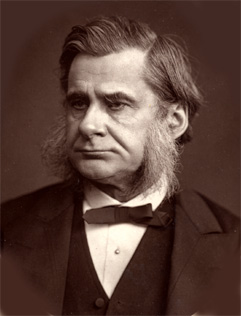
Thomas Henry Huxley was an English biologist and anthropologist who specialized in comparative anatomy. He has become known as "Darwin's Bulldog" for his advocacy of Charles Darwin's theory of evolution.

The Blind Watchmaker: Why the Evidence of Evolution Reveals a Universe without Design is a 1986 book by Richard Dawkins, in which the author presents an explanation of, and argument for, the theory of evolution by means of natural selection. He also presents arguments to refute certain criticisms made on his first book, The Selfish Gene. An unabridged audiobook edition was released in 2011, narrated by Richard Dawkins and Lalla Ward.
"On the Tendency of Species to form Varieties; and on the Perpetuation of Varieties and Species by Natural Means of Selection" is the title of a journal article, comprising and resulting from the joint presentation of two scientific papers to the Linnean Society of London on 1 July 1858: On The Tendency of Varieties to Depart Indefinitely from the Original Type by Alfred Russel Wallace and an Extract from an unpublished Work on Species from Charles Darwin's Essay of 1844. The article also includes an Abstract of a Letter from Darwin to Asa Gray, and an introductory letter by Joseph Dalton Hooker and Charles Lyell. The article was the first announcement of the Darwin–Wallace theory of evolution by natural selection; and appeared in print on 20 August 1858. The presentation of the papers spurred Darwin to write a condensed "abstract" of his "big book", Natural Selection. This was published in November 1859 as On the Origin of Species.

Andrew Norman Wilson is an English writer and newspaper columnist known for his critical biographies, novels and works of popular history. He is an occasional columnist for the Daily Mail and a former columnist for the London Evening Standard. He has been an occasional contributor to The Times Literary Supplement, New Statesman, The Spectator and The Observer.

Michael Ruse is a British-born Canadian philosopher of science who specializes in the philosophy of biology and works on the relationship between science and religion, the creation–evolution controversy, and the demarcation problem within science. Ruse currently teaches at Florida State University.
Following the inception of Charles Darwin's theory of natural selection in 1838, the development of Darwin's theory to explain the "mystery of mysteries" of how new species originated was his "prime hobby" in the background to his main occupation of publishing the scientific results of the Beagle voyage. He was settling into married life, but suffered from bouts of illness and after his first child was born the family moved to rural Down House as a family home away from the pressures of London.

The publication of Darwin's theory brought into the open Charles Darwin's theory of evolution through natural selection, the culmination of more than twenty years of work.
The immediate reactions, from November 1859 to April 1861, to On the Origin of Species, the book in which Charles Darwin described evolution by natural selection, included international debate, though the heat of controversy was less than that over earlier works such as Vestiges of Creation. Darwin monitored the debate closely, cheering on Thomas Henry Huxley's battles with Richard Owen to remove clerical domination of the scientific establishment. While Darwin's illness kept him away from the public debates, he read eagerly about them and mustered support through correspondence.

Vestiges of the Natural History of Creation is an 1844 work of speculative natural history and philosophy by Robert Chambers. Published anonymously in England, it brought together various ideas of stellar evolution with the progressive transmutation of species in an accessible narrative which tied together numerous scientific theories of the age.
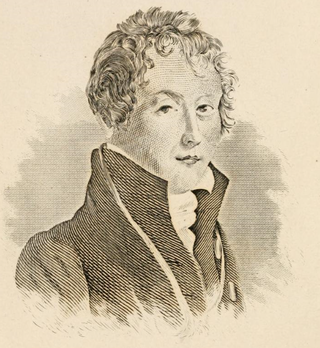
Reverend Robert Taylor, was an early 19th-century Radical, a clergyman turned freethinker. His "Infidel home missionary tour" was an incident in Charles Darwin's education, leaving Darwin with a memory of "the Devil's Chaplain" as a warning of the dangers of dissent from Church of England doctrine.
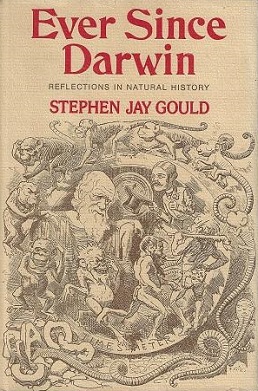
Ever Since Darwin is a 1977 book by the paleontologist Stephen Jay Gould. Gould's first book of collected essays, it originated from his monthly column "This View of Life," published in Natural History magazine. Edwin Barber—who was then the editorial director for W. W. Norton & Company— encouraged Gould to produce a book. He soon commissioned Gould to write The Mismeasure of Man, but it was not until three years later, when Gould accumulated 33 columns, that it occurred to either of them that the Natural History columns should be published in a single volume. The collection of essays, written between 1973–1977, became a best-seller and propelled Gould to national prominence.
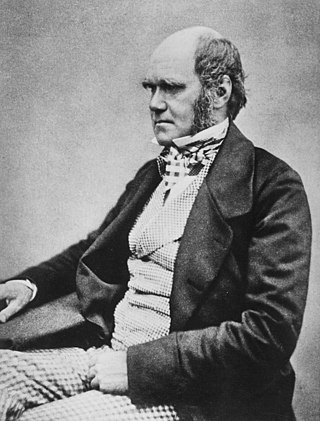
Charles Robert Darwin was an English naturalist, geologist and biologist, widely known for his contributions to evolutionary biology. His proposition that all species of life have descended from a common ancestor is now generally accepted and considered a fundamental concept in science. In a joint publication with Alfred Russel Wallace, he introduced his scientific theory that this branching pattern of evolution resulted from a process he called natural selection, in which the struggle for existence has a similar effect to the artificial selection involved in selective breeding. Darwin has been described as one of the most influential figures in human history and was honoured by burial in Westminster Abbey.

Darwin's Angel is a book published in response to Richard Dawkins' The God Delusion. It was written by John Cornwell and subtitled An Angelic Riposte to The God Delusion.

The 1860 Oxford evolution debate took place at the Oxford University Museum in Oxford, England, on 30 June 1860, seven months after the publication of Charles Darwin's On the Origin of Species. Several prominent British scientists and philosophers participated, including Thomas Henry Huxley, Bishop Samuel Wilberforce, Benjamin Brodie, Joseph Dalton Hooker and Robert FitzRoy.

The following list of publications by Richard Dawkins is a chronological list of papers, articles, essays and books published by British ethologist and evolutionary biologist Richard Dawkins.
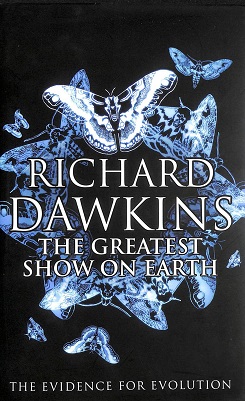
The Greatest Show on Earth: The Evidence for Evolution is a 2009 book by British biologist Richard Dawkins, which was released on 3 September 2009 in the UK and on 22 September 2009 in the US. It sets out the evidence for biological evolution, and is Dawkins's 10th book, following his best-selling critique of religion The God Delusion (2006) and The Ancestor's Tale (2004), which traced human ancestry back to the dawn of life.

Science in the Soul: Selected Writings of a Passionate Rationalist is a book of selected essays and other writings by Richard Dawkins published in 2017.

















